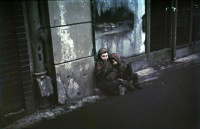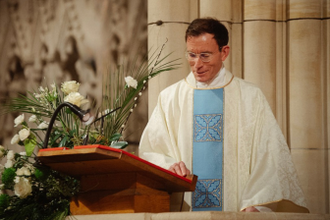Holocaust Memorial Day: The Ecumenism of Suffering - Part 2

Starving children Warsaw Ghetto image: German Federal Archive
In his diary written in the Warsaw Ghetto, Chaim A Kaplan wrote this entry for October 2nd 1940:
Again: everything is forbidden to us; and yet we do everything! We make our "living" in ways that are forbidden, and not by permission.
It is the same with community prayers: secret minyanim in their hundreds all over Warsaw hold prayers together and do not leave out even the most difficult hymns.
…Near the main synagogue some side room is chosen with windows facing the courtyard, and there hearts are poured out to the God of Israel in whispered supplications. This time it is without cantors and without choirs; there are only whispered prayers, but the prayer comes from the heart; even tears may be wept secretly, and the gates of the tears cannot be locked....
Perhaps Pope Francis has read this, but certainly his response to Glyzelle Palomars in Manila when she sobbed out her question about the suffering of children, ‘Why is God allowing such things to happen even if it is not their fault?’ suggests that he like Chaim Kaplan understand the gift of tears. Francis, holding the little girl close to him, and visibly moved, replied to that almost unanswerable question. He said, ‘certain realities of life are only seen with eyes that are cleansed with tears. I ask each one of you to ask: Can I weep? Can I weep when I see a child is hungry, on drugs…Be brave. Don’t be afraid to cry’.
As we remember the Holocaust this January 27th and also all the other appalling events and sufferings that we humans manage to inflict on each other, on other creatures and the life of the world, perhaps we too should ask ourselves that question. Can I weep? It is easy to salve our consciences by claiming absence either of distance or time, but that is just not good enough. Those of us who follow Jesus need to heed his words, ‘if you did it to the last of these, you did it to me’. Our prayers and worship are offered to the Most High God through the intercession of that great Communion of Witnesses, among whom are those who witnessed to Christ by the shedding of their blood. This in itself is a reminder that all of us are linked together.
The Holocaust brings us all to a moment where the human family is in judgement because it refused to be truly ecumenical, so many by passivity or active complicity turned away from their neighbour and what makes it worse is that the Holocaust was not simply the murder of people but the active and total attempt to eradicate all of the Jews because of their race. The fate of the European Roma was similar to this although there were exceptions, but in the terrible scheme of things that itself does not mitigate anything at all.
These innocent people like so many others before and since are the living tears of suffering. What can we do? Chaim Kaplan wrote one word in his diary, ‘record’ we then add to this ‘and remember’. The last survivors of the holocaust will not be with us for much longer and when they go there will be those who (as now) try to play down such horrors or excuse such happenings. But we cannot. The wound, though healed in some ways remains and must be seen, understood and remembered so that we prevent as far as possible these things happening again.
The gift of tears is a way of entering into that terrible mystery of suffering and of God’s presence, not absence, in the midst of it. To weep is to become part of the compassion of God, through our tears our hearts and minds open to another reality and as in all great religious traditions we begin to have that compassion for all things not only ourselves. Pope Francis commented on the visit of the Armenian Patriarch l to him last year that the ‘...ecumenism of suffering and of martyrdom are a powerful summons to walk the long path of reconciliation…by courageously and decisively abandoning ourselves to the Holy Spirit’. Through our tears, mourning shall be changed into dancing, but it does not happen overnight, always we need to ‘record and remember’.
Fr Robin Gibbons is an Eastern Rite Chaplain for the Melkite Greek Catholics in Britain.















